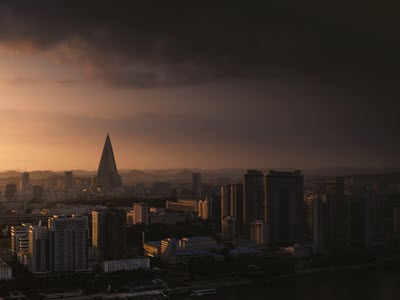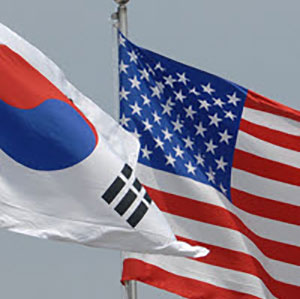U.S. Accountability for Human Rights on the Korean Peninsula
Stephan Sonnenberg makes the case that restoring a sense of justice at the grassroots level is necessary for the geopolitical alliance between the United States and South Korea to remain robust.
During the period between President Yoon Suk Yeol declaring martial law on December 3, 2024, and South Korea’s Constitutional Court upholding his impeachment on April 4, 2025, Seoul was flooded with hundreds of thousands of protestors. Some invoked the youthful energy of South Korean popular culture, demanding the president’s impeachment and political change. Others waved the U.S. and South Korean national flags as symbols of a “stop the steal” rally in defense of President Yoon. The president’s efforts to silence his political opposition failed within hours, in large part due to the quick action by legislators, civil society actors, and the thousands of regular citizens who spontaneously converged on the government quarter in Seoul. The South Korean soldiers who refused to follow orders to use lethal force that December night also played a critical role in upholding the country’s constitutional commitments to democracy and freedom.
A casual observer parachuting into Seoul might have been confused by the association of the U.S. flag with the authoritarian actions of President Yoon. While many in the United States still believe that the United States and its flag should stand as a shining beacon on a hill, in South Korea, by contrast, the U.S. flag was instead invoked in this instance as a symbol of the authoritarian virtues embodied in President Yoon’s efforts to silence opposing views. This association stems from the United States’ troubling and understudied involvement with South Korea in the twentieth century. Starting in 1945, when the United States took control of the southern half of the Korean Peninsula after Japan’s defeat in World War II, and lasting throughout South Korea’s independence, the Korean War, and well into the 1980s when the South Korean people finally liberated themselves from the oppressive military regime, the United States has at times weighed in on the wrong side of the human rights equation in South Korea. To atone for this history is crucially important for contemporary U.S. national security, economic, and foreign policy interests.
I run a legal clinic at Seoul National University’s School of Law, which is generally considered to be South Korea’s top law school. In 2023, my students and I partnered with South Korean and U.S. human rights organizations to publish a report documenting the urgent need for the United States to take responsibility for its legacy of human rights violations against the South Korean people. The list of U.S. human rights abuses, war crimes, and outright crimes against humanity is long and sobering. Our report chose to summarize a few crucial episodes:
- The people of South Korea’s Jeju Island remember a series of devastating massacres unfolding between 1947 and 1953 in which an estimated 10% of the island’s population was murdered in the name of anti-Communism under the direct supervision of U.S. military authorities.
- The people of Daejeon in central South Korea annually commemorate the place where in 1950 the U.S. military approved and painstakingly documented the killing of thousands of political prisoners in a field on the outskirts of town—one of hundreds of such massacre sites scattered throughout South Korea.
- In the small village of No Gun Ri, not far from Daejeon, villagers recall how U.S. soldiers gunned down an estimated four hundred of their ancestors—mostly women, elderly, and children—as they were attempting to flee the advancing North Korean troops.
- Hundreds of women commonly referred to as gijichon brought a lawsuit seeking compensation from the South Korean authorities for having been forcibly recruited and trafficked into sexual servitude, with the active complicity of the U.S. military authorities, for the “benefit” of American service members stationed in Korea.
In each case, the role of the United States is direct and troubling. South Korean politicians, and to a lesser extent also South Korean civil society and academia, have largely refrained from demanding accountability from the United States, justifying their uncomfortable silence as the “protection price” that a politically and economically weaker South Korean state must pay to stay under the U.S. security umbrella. They have kept references to these undeniable atrocities out of official school lesson plans and chosen to frame what happened as “unavoidable tragedies” rather than “willful violations.” But this silence should not be mistaken for blindness, ignorance, and certainly not forgiveness or forgetfulness. Moreover, South Korea is now the world’s tenth-largest economy, and its people are increasingly asking whether the alliance is still as crucial to South Korean well-being as it once was.
The United States can and should speak and act in defense of Korean democracy and human rights—not just in North Korea but also in the South. To do so effectively, however, it must first atone for its own human rights violations. This would reinforce the bedrock of the 80-year alliance between South Korea and the United States, dating back to General Douglas MacArthur’s issuance of Proclamation No. 1 on September 7, 1945. The alliance should be built around not just displays of military might and fear of the unknown but also a commitment to values, democracy, and respect for human rights.
Likewise, some experts argue that addressing historical issues is essential for the United States to engage with North Korea while the two are still technically at war. President Donald Trump has announced his intention to revive a process of political and military normalization with the North. Regardless of their party affiliation, policymakers of all stripes should be able to commend him for his efforts to pursue peace. But doing so while also denying the reality that the United States has been deeply complicit in serious human rights harms will not facilitate that peacemaking process.
South Korean civil society is strong, vocal, and capable, and government institutions designed to safeguard human rights generally function effectively. South Koreans built these institutions the hard way—by themselves, after years of bloody resistance to military dictatorship. Honest acknowledgment from the United States that it has committed human rights violations in the past, that it wishes to make meaningful apologies to the affected communities, and that it is determined to work toward a new era of partnership and solidarity could help repair fractures in the relationship between the United States and the South Korean people, especially for those communities that have been victimized by decades of U.S. human rights abuse. Restoring a sense of justice at the grassroots level is necessary for the geopolitical alliance between the United States and South Korea to remain robust.
The best place for that process to be initiated is the U.S. Congress. Congress has catalyzed similar processes before in the cases of the Tuskegee syphilis experiments and the internment of Japanese Americans during World War II. It has the power to issue a formal apology and pave the way for reparations and proper memorialization efforts. The need for such an initiative has never been more urgent.
Stephan Sonnenberg is an Associate Professor and Director of the Human Dignity Clinic and the Difficult Conversations Clinic at Seoul National University School of Law.



